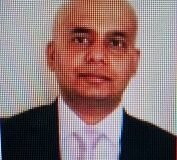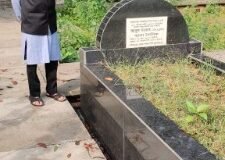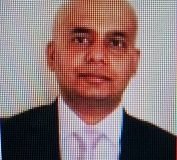We also had many in our own age group to play with. On a hot summer day, before lunch, it was
always time for a swim in the Gangina (rivulet) at the outer boundary of the village. That meant
taking off all clothes and getting into the fast current of the canal and swimming to our heart’s
content. In the evening, it was mostly ha du du again by the side of the Gangina. When I later
returned to nana bari as a grown-up man, to find the Gangina of my childhood much reduced, I
enquired about my co-swimmers. They had mostly become agricultural day labourers. Some of the
luckier ones had become industrial workers in Narayanganj. Far removed were the carefree scenes
and pastimes of childhood.
In those days, water-borne diseases were quite common, Syedpur being a low-lying area. The only
hand pump in the village would often go out of order and contaminated water also got into it
sometimes. While water for drinking would be boiled and treated with alum in richer and educated
households, which were few and far between, most households of Syedpur drank the untreated
water despite warnings from my nanaji. So, the outbreak of cholera was quite common in those
days. Once when I returned to Syedpur after a year, I came to learn that one of my good friends had
fallen victim to this dreaded disease. It was perhaps my first encounter with death and hence
extremely painful. As if this were not trauma enough, in the village graveyard I also came across his
skull, which the rain water had flushed unceremoniously out of his grave.
We had to go to the qari sahib (the religious instructions teacher) in the mosque to learn Arabic and
the suras (verses from the Qur’an). Since he knew that we were guests in the house of the union
board president, he did not cane us much, only once in a while, perhaps in order to keep some parity
with his treatment of other students. However, he fed us with a lot of horribly wrong information
during our discussions with him. First, according to him the sun revolved round the earth. Second,
women were the original source of sin. Third, at the feet of husbands lay the heaven of the wives.
Only years later did I learn that none of these had anything to do with Islam.
It was at this time that I came across a song and an official related to jute. One important line of the
song was ‘Nailla Uraiya Nilo Chaura Loker Man’ (The jute has swept away the dignity of the people of
the alluvial land). The official was the PLA (public loan assistant) whose job was to implement the
government policy of restricting the jute acreage. The PLA for nanaji’s union lived in Syedpur. I did
not understand why the jute acreage had to be restricted at all since I would see many villagers
approaching him with folded hands to leave their jute fields outside the restriction and he had
acquired the reputation of making money out of granting favours in this regard. It was only much
later that I understood that in order to reduce the wide fluctuations in the price of jute from one
year to another, the government went for restricting the jute acreage, lest the cultivators suffer
from low prices due to over-production. Indeed, over-production and low jute prices ruined many
farmers, and hence this song.
From village to small towns
In late 1951, Abba was posted to Netrakona as sub-divisional controller of food. We had a lovely and
spacious tin-roofed house in the so-called Sahib Para (officers’ neighbourhood) on the bank of the
Mogra. Behind our house was a large playground where football matches were regularly held
Sundays. Before my admission to the school, my favourite pastime had been watching football
matches in this playground. I wondered why the players at half-time would take a lot of lime. I also
failed to understand why most players were barefooted and only a few had boots on. I observed
that every team had different jerseys and that star players were more interested in exhibiting their
individual skills, particularly in dribbling, than in short passes and teamwork.
I thoroughly enjoyed the exchange of provocative comments and occasional brawls breaking out
between the fans of the opposing teams, and sometimes the police would have to intervene with a
light lathi charge to disperse the unruly crowd. However, it was the decision of the referee in one of
the matches that enthralled me. A player had committed a serious foul but he not only refused to
accept that in good grace but also prevented the free kick awarded by the referee from being
delivered. At this point, the referee blew his whistle, called the player in question and thundered in
English in a loud voice, ‘Get out of the field’. This was my first acquaintance with a complete English
sentence, and I would often repeat it, lest I forgot.
Barda and I were admitted to Dutta High English School, Barda in Class IV and I in Class III. Later I
learnt that some of my father’s colleagues had recommended Anjuman HE School. After much
thought, abba and amma decided in favour of Dutta School because most of the teachers there were
Hindus. Abba, despite his brief Muslim League sympathies during his college days, firmly believed
that Hindu teachers were far more sincere, knowledgeable and idealistic compared with their
Muslim counterparts. He told us how his Hindu teachers at Laksam HE School had changed his
academic life. It was, therefore, no surprise that a Hindu gentleman, Deben Babu, was also
employed as our private tutor. That was indeed a stroke of good luck for us. Deben Babu was calm
and patient and I soon became his willing disciple.
In Dutta High School, chalk and slates replaced jingla and kalapta that we used in Kailash Pundit’s
pathshala. Soon we also got into the habit of using pencil for rough work and inkwell, nib-pen and
blotting paper for home work and examinations. By the time, I went to the PAF Public School,
Sargodha, the age of the fountain pen had arrived but I could only afford the cheapest brands. That
meant my right hand was often covered with ink leaking from the pen. In Dhaka University, life
became easy with the coming of the ball point. Several decades later, we were word-processing on
the computer, which meant an unimaginable leap in writing technology in our life time. Who knows
what will come next?
I had no difficulty at school either. The teachers made learning so easy and interesting that soon it
became an addiction to me. The teachers in the school did not openly exhibit their admiration for
good students but made it implicit that we were in their good books. However, for breaking school
discipline and being rowdy and naughty, the cane was used quite liberally, irrespective of one’s
academic standing. I had my due share of caning. However, the same teacher who caned you would
visit you at home to cheer you up if you were sick and unable to attend classes.
Once I complained to abba about caning at school. He replied, ‘Baba, I also had my share of caning
when I was in school. One day, you will proudly tell everyone that you were caned by your teachers.’
From 2005 to 2009, I was an elected member of the United Nations Committee on the Rights of the
Child (UNCRC) and I do take the public position that corporal punishment in the educational
institutions is totally unacceptable. But I also believe that in our times, it was perhaps all right, at
least for me. I have no bitter memory for being caned nor do I think that it in any way damaged me,
psychologically or physically.
Rivalry between Dutta High School and Anjuman School in the football field was intense. Dutta High
School at that time had the best school football team, mainly because of three brothers, mishti,
manda and naru (all named after sweetmeats). They were perpetually in Class X because they would
regularly fail in the matriculation examinations. In 1956, Dutta High School participated in the East
Pakistan school football competition and came out as champion. Barda and I were there in the
Dhaka University football field to cheer our old school in the final match. I was greatly amused to
find that the youngest of the three brothers was still playing for the school team.
Barda at that time had tendencies which had little to do with studies. He was fond of playing
football, stealing money from abba’s pockets to buy chanachur (a spicy snack), reading Dasyu Mohan
thrillers, forming groups with boys of his age-group in the neighbourhood and spending time with
them and engaging in all kinds of naughtiness. He did not always get along with them although he
was their leader. As a sequel to one of those quarrels, he refused to return the football belonging to
one of his friends. The matter was reported to amma, who gave him a thrashing, extracted the
football out of his secret hiding place and returned it to the aggrieved boy. Barda also persuaded me
to steal achar (mango pickle) from the almirah when abba and amma would take a nap in the
afternoon of a holiday. If caught, I would bear the brunt; so one day, I spilled the beans and made it
clear that I was only barda’s instrument in this stealing exercise.
Barda did not pay much heed to Deben Babu and his school records left much to be desired. Abba
was much annoyed with him and once in a while gave him a thrashing while amma would add a
verbal lashing. There also would be quarrels between abba and amma over barda. It was the usual
story: whose indulgence was more responsible for his wayward ways?
At that time, sugar from Cuba would come in cloth bags. In our lower middle-class family where
frugality was the order of the day, such bags were to be fully utilised. Amma had a Singer sewing
machine and she would make the three of us shorts out of that cloth but when we went to school or
played in those shorts, fellow students would tease us because the blue lettering on the cloth would
not come off so easily (maybe only after several washings). When we would lodge our protest with
amma and declare that we would not put on these shorts any longer, she would start sobbing.
‘Babara (children), this is all we can afford. Do you know how Ishwarchandra Vidyasagar got his early
education? Do not allow them to upset you.’
We encountered difficulties not only with clothes but with shoes. In those days, most students came
to the school barefooted and any exception would be ridiculed as ‘showing off’. Abba and amma
would insist on us putting on shoes because it was the hygienic thing to do. So, between the two of
us, we devised an alternative, namely walking up to the school with shoes on, hiding them in a bush
and entering the school compound barefooted. In fact, we continued with this practice in Sylhet
Government High School and Dhaka Technical School.
As the month of February approached in 1952, we saw that on a regular basis picketing was going on
to bring out the students of our school for demonstrations in connection with the language
movement, then raging in full fury all over the country. We had no idea what it was all about but we
religiously refused to be drawn into the demonstrations. We had so many other things to do, like
walking by the Mogra, playing golla chhut (a local outdoor game) or watching football games.
However, perhaps on February 22, that is one day after the infamous police shooting had taken
place in Dhaka University, leading to the death of several university students, we could not escape
being drawn into the procession. We paraded the whole town and under the leadership of the older
students shouted slogans such as, ‘Rashtra Bhasha Bangla Chai, Nurul Aminer Kalla Chai” (We want
Bengali as the state language and the head of chief minister Nurul Amin). Despite being February, it
was an exceptionally hot day, and though on empty stomachs, barda and I had been in the
procession for several hours. We returned home rather late, thoroughly exhausted. After the late
midday meal, I felt very feverish and soon took to bed. When I woke up several hours later, I was
running a high temperature. Amma was beside me, slowly pouring cold water over my head to bring
down the temperature and at the same time teasing me gently, ‘So why did you have to go into this
procession? What do you understand of the language movement? Do you know what rashtra bhasha
is? Do you know who Nurul Amin is? Where are those picketers now who dragged you to the
procession?’
Abba did not rebuke us nor did he complain to anybody. We soon came to understand that both
amma and abba were quite sympathetic towards the language movement. It was only after talking
to Deben Babu that we understood the full import of what was going on. We felt proud of what we
had done although at that time we did not know why we had joined the procession.
It was now the rainy season and the Mogra was in spate. The flood waters were all around us, and
we saw Ali Newaz, our cook, catching fish by using pala and koch. Flood waters soon receded but the
rains were incessant. Perhaps it was July or August. There was a big political meeting in the football
ground behind our house. It was the afternoon of a holiday and we were also there to listen to the
political leaders although we understood nothing of their speeches. The meeting was addressed by
Shaheed Suhrawardy, Maulana Bhashani, Sheikh Mujibur Rahman and many others. Suddenly, there
was a heavy downpour and people started taking shelter wherever they could. We also rushed back
home which was only a stone’s throw from the football ground. Soon we found to our surprise that
Suhrwardy and Sheikh Mujibur Rahman also got down from the dais and took shelter in the servants’
quarters of our house. But as we learnt later, one person went on speaking in fiery language braving
the rains. He was none other than Maulana Abdul Hamid Khan Bhashani.
As soon as abba came to learn that there were these two VIPs in his servants’ quarters he rushed
there and implored the guests to come to the drawing room. It was with much reluctance that the
guests agreed, and when they came to the drawing room, Huntley biscuits and freshly brewed tea
were served to them, which they enjoyed immensely. Towels were also provided so that they could
dry off. Suhrawardy asked abba what he did for a living. When abba disclosed his identity,
Suhrawardy was apprehensive lest this hospitality would affect abba’s job. Abba replied that he was
not afraid of that.
Kamal Siddiqui, a career civil servant, worked as the principal secretary in the Prime Minister’s Office
and as the cabinet secretary. He has to his credit a large number of academic publications from both
home and abroad.
 Weekly Bangla Mirror | Bangla Mirror, Bangladeshi news in UK, bangla mirror news
Weekly Bangla Mirror | Bangla Mirror, Bangladeshi news in UK, bangla mirror news





